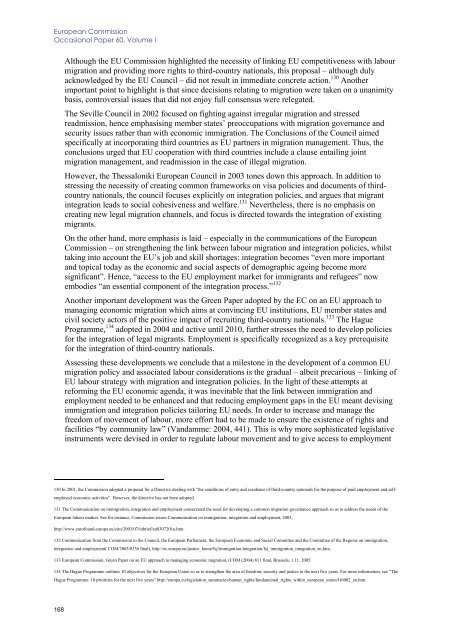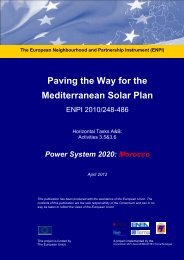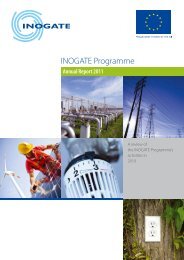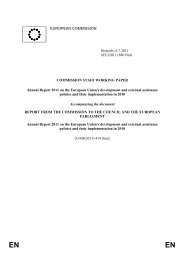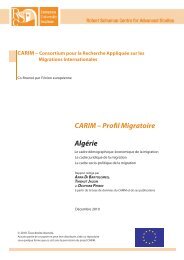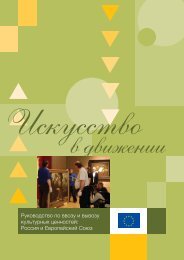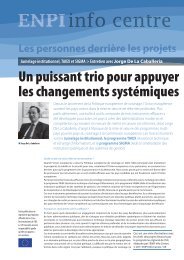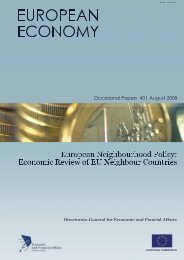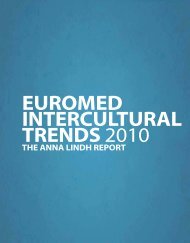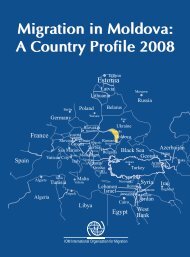<strong>European</strong> CommissionOccasional Paper 60, Volume IAlthough the EU Commission highlighted the necessity of linking EU competitiveness with labour<strong>migration</strong> <strong>and</strong> providing more rights to third-country nationals, this proposal – although dulyacknowledged by the EU Council – did not result in immediate concrete action. 130 Anotherimportant point to highlight is that since decisions relating to <strong>migration</strong> were taken on a unanimitybasis, controversial issues that did not enjoy full consensus were relegated.The Seville Council in 2002 focused on fighting against irregular <strong>migration</strong> <strong>and</strong> stressedreadmission, hence emphasising member states’ preoccupations with <strong>migration</strong> governance <strong>and</strong>security issues rather than with economic im<strong>migration</strong>. The Conclusions of the Council aimedspecifically at incorporating third countries as EU partners in <strong>migration</strong> management. Thus, theconclusions urged that EU cooperation with third countries include a clause entailing joint<strong>migration</strong> management, <strong>and</strong> readmission in the case of illegal <strong>migration</strong>.However, the Thessaloniki <strong>European</strong> Council in 2003 tones down this approach. In addition tostressing the necessity of creating common frameworks on visa policies <strong>and</strong> documents of thirdcountrynationals, the council focuses explicitly on integration policies, <strong>and</strong> argues that migrantintegration leads to social cohesiveness <strong>and</strong> welfare. 131 Nevertheless, there is no emphasis oncreating new legal <strong>migration</strong> channels, <strong>and</strong> focus is directed towards the integration of existingmigrants.On the other h<strong>and</strong>, more emphasis is laid – especially in the communications of the <strong>European</strong>Commission – on strengthening the link between labour <strong>migration</strong> <strong>and</strong> integration policies, whilsttaking into account the EU’s job <strong>and</strong> skill shortages: integration becomes “even more important<strong>and</strong> topical today as the economic <strong>and</strong> social aspects of demographic ageing become moresignificant”. Hence, “access to the EU employment <strong>market</strong> for immigrants <strong>and</strong> refugees” nowembodies “an essential component of the integration process.” 132Another important development was the Green Paper adopted by the EC on an EU approach tomanaging economic <strong>migration</strong> which aims at convincing EU institutions, EU member states <strong>and</strong>civil society actors of the positive impact of recruiting third-country nationals. 133 The HagueProgramme, 134 adopted in 2004 <strong>and</strong> active until 2010, further stresses the need to develop policiesfor the integration of legal migrants. Employment is specifically recognized as a key prerequisitefor the integration of third-country nationals.Assessing these developments we conclude that a milestone in the development of a common EU<strong>migration</strong> policy <strong>and</strong> associated labour considerations is the gradual – albeit precarious – linking ofEU labour strategy with <strong>migration</strong> <strong>and</strong> integration policies. In the light of these attempts atreforming the EU economic agenda, it was inevitable that the link between im<strong>migration</strong> <strong>and</strong>employment needed to be enhanced <strong>and</strong> that reducing employment gaps in the EU meant devisingim<strong>migration</strong> <strong>and</strong> integration policies tailoring EU needs. In order to increase <strong>and</strong> manage thefreedom of movement of labour, more effort had to be made to ensure the existence of rights <strong>and</strong>facilities “by community law” (V<strong>and</strong>amme: 2004, 441). This is why more sophisticated legislativeinstruments were devised in order to regulate labour movement <strong>and</strong> to give access to employment130 In 2001, the Commission adopted a proposal for a Directive dealing with “the conditions of entry <strong>and</strong> residence of third-country nationals for the purpose of paid employment <strong>and</strong> selfemployedeconomic activities”. However, the directive has not been adopted.131 The Communication on im<strong>migration</strong>, integration <strong>and</strong> employment consecrated the need for developing a common <strong>migration</strong> governance approach so as to address the needs of the<strong>European</strong> labour <strong>market</strong>. See for instance, Commission issues Communication on im<strong>migration</strong>, integration <strong>and</strong> employment, 2003,http://www.eurofound.europa.eu/eiro/2003/07/inbrief/eu0307201n.htm.132 Communication from the Commission to the Council, the <strong>European</strong> Parliament, the <strong>European</strong> Economic <strong>and</strong> Social Committee <strong>and</strong> the Committee of the Regions on im<strong>migration</strong>,integration <strong>and</strong> employment( COM/2003/0336 final), http://ec.europa.eu/justice_home/fsj/im<strong>migration</strong>/integration/fsj_im<strong>migration</strong>_integration_en.htm.133 <strong>European</strong> Commission, Green Paper on an EU approach to managing economic <strong>migration</strong>, (COM (2004) 811 final, Brussels, 1.11. 2005.134 The Hague Programme outlines 10 objectives for the <strong>European</strong> Union so as to strengthen the area of freedom, security <strong>and</strong> justice in the next five years. For more information, see “TheHague Programme: 10 priorities for the next five years” http://europa.eu/legislation_summaries/human_rights/fundamental_rights_within_european_union/l16002_en.htm.168
Chapter IIIEU Migration Policy towards Arab Mediterranean Countries <strong>and</strong> its Impact on their <strong>Labour</strong> Marketsin the framework of <strong>migration</strong> <strong>and</strong> integration. 135 The Directive providing for free movement ofthird-country nationals who have acquired long-term resident status (2003/109) is thought to be oneof the instruments which have increased “the pressure on the EU to move towards a commonposition on economic <strong>migration</strong>” (Guild: 2007. 1).Despite these developments, while progress is made on the integration of third-country migrantsworking within the EU, a structured labour-<strong>migration</strong> strategy targeting legal economic im<strong>migration</strong><strong>and</strong> the first entry of third-country migrants for employment activities faced much resistance in the EUCouncil. Therefore, a more concrete approach on how the latter could benefit EU economiccompetitiveness remains underdeveloped. This was particularly evident in the following illustrativecases.In July 2001, the Commission presented a proposal drafting conditions <strong>and</strong> rules of admission forthe entry <strong>and</strong> residence of migrants for the purpose of paid employment <strong>and</strong> self-employmentactivities. 136 Nonetheless, the Commission had to withdraw this proposal in 2006.The difficulty of adopting common legal positions with regard to labour <strong>migration</strong> among memberstates was particularly conspicuous in the Hague Programme (Carrera: 2007, 4). Indeed, the<strong>European</strong> Council made clear at this stage that labour im<strong>migration</strong> was a national competence <strong>and</strong>that adopting common legal positions with regard to labour migrants was still far-fetched. Also, in2007, the Commission proposed the adoption of a common sanctions for employers recruitingthird-country nationals without employment permission in 2007. Yet this proposal faced stridentopposition <strong>and</strong> has not been adopted. 137In sum, the <strong>European</strong> Commission’s emphasis on developing a common labour <strong>migration</strong>framework has been at odds with the desire of EU member states to retain their prerogatives in thissphere <strong>and</strong> to resist a communitarian policy which would circumscribe or curb national decisionmaking.These inherent tensions at the EU level not only hindered the elaboration of a common EUlabour strategy, but have indirectly got in the way of identifying <strong>and</strong> responding to labour-<strong>market</strong>needs in the Euro-Mediterranean region.1.3 The interconnectedness between the Global Approach to Migration <strong>and</strong> economicim<strong>migration</strong> since 2005: an integrative or partial process?Since 2005, the interconnectedness between establishing <strong>and</strong> regulating legal <strong>migration</strong> channels, amore holistic approach to <strong>migration</strong>, <strong>and</strong> a more coherent EU labour strategy with regard to economicim<strong>migration</strong> have all been stressed, especially by the <strong>European</strong> Commission which has activelypromoted the “<strong>European</strong>isation” <strong>and</strong> the “continuous reinvention of the <strong>European</strong> strategy” in thedomain of regular <strong>migration</strong> (Carrera, 2007: 3).On the one h<strong>and</strong>, more attention is paid to the need to regulate <strong>migration</strong> <strong>flows</strong> in order to fightirregular <strong>migration</strong> <strong>and</strong> address challenges linked to <strong>European</strong> demographic gaps <strong>and</strong> theirrepercussions on labour <strong>market</strong>s. For instance, in December 2005, the Commission issued a PolicyPlan on Legal Migration which further set out the roadmap that the EU would embark on in orderto concretise the Hague Programme. 138 The policy plan explicitly addresses policy features <strong>and</strong>135 Legal instruments are devised to recognize rights such as access to employment <strong>and</strong> to education/training, <strong>and</strong> equality of treatment. See for instance council directive 2003/86 on theright to family reunification, council directive 2003/109 concerning the status of third-country nationals who are long-term residents <strong>and</strong> council directive 2004/83 on minimum st<strong>and</strong>ardsfor the qualifications <strong>and</strong> status of third country nationals. EU legislation on anti-discrimination also endorses this framework (directives 2000/43/EEC, directive 2000/78/EEC).136 <strong>European</strong> Commission, “proposal for a Council Directive on the conditions of entry <strong>and</strong> residence for the purpose of paid employment <strong>and</strong> self-employment activities”, COM (2001)0386 final, Brussels,http://eur-lex.europa.eu/LexUriServ/LexUriServ.do?uri=COM:2001:0386:FIN:EN:PDF.137 “Proposal for a Directive of the <strong>European</strong> Parliament <strong>and</strong> of the Council providing for sanctions against employers of illegally staying third-country nationals " COM (2007) 249 final,Brussels,http://eur-lex.europa.eu/LexUriServ/LexUriServ.do?uri=CELEX:52007PC0249:EN:NOT.138 <strong>European</strong> Commission, Policy Plan on Legal Migration (2005)1680,169
- Page 5 and 6:
STUDYLABOUR MARKETS PERFORMANCE AND
- Page 7 and 8:
Table of ContentsLABOUR MARKETS PER
- Page 10:
8.1 Actual migration and consumptio
- Page 15 and 16:
Chapter IFinal Report 15 MILLION NE
- Page 17 and 18:
Chapter IFinal Report …so that MI
- Page 19 and 20:
Chapter IFinal Reportroots). The cu
- Page 21 and 22:
Chapter IFinal Report In AMCs, REMI
- Page 23 and 24:
Chapter IFinal Reportpolicies. This
- Page 25 and 26:
Chapter IFinal ReportMediterranean
- Page 27 and 28:
Chapter IFinal ReportMore recently,
- Page 29 and 30:
Chapter IFinal Reportfor EU employm
- Page 31 and 32:
Chapter IFinal Reportchosen, these
- Page 33 and 34:
Chapter IFinal Reportexit of women
- Page 35 and 36:
Chapter IFinal ReportFigure 1.2.1.
- Page 37 and 38:
Chapter IFinal ReportA Declining Em
- Page 39 and 40:
Chapter IFinal ReportThe same year,
- Page 41 and 42:
Chapter IFinal ReportTable 2.2.1. I
- Page 43 and 44:
Chapter IFinal Reportminimum wages
- Page 45 and 46:
Chapter IFinal Report2.4 Unemployme
- Page 47 and 48:
Chapter IFinal ReportYouth Unemploy
- Page 49 and 50:
Chapter IFinal ReportBut one should
- Page 51 and 52:
Chapter IFinal Reportmillion) 10 .
- Page 53 and 54:
Chapter IFinal Reportmight intensif
- Page 55 and 56:
Chapter IFinal Reporttrue labour ma
- Page 57 and 58:
Chapter IFinal Reportto reform the
- Page 59 and 60:
Chapter IFinal ReportFrom a differe
- Page 61 and 62:
Chapter IFinal ReportTable 4.2.1 Ou
- Page 63 and 64:
Chapter IFinal ReportSource: Adams
- Page 65 and 66:
Chapter IFinal Reportin the destina
- Page 67 and 68:
Chapter IFinal ReportIn conclusion,
- Page 69 and 70:
Chapter IFinal Reportorganised in B
- Page 71 and 72:
Chapter IFinal Reportsecond Intifad
- Page 73 and 74:
Chapter IFinal Reportstands at 29.7
- Page 75 and 76:
Chapter IFinal Reportconstruction w
- Page 77 and 78:
Chapter IFinal ReportAs far as the
- Page 79 and 80:
Chapter IFinal Reportother cases, l
- Page 81 and 82:
Chapter IFinal Reportunemployment a
- Page 83 and 84:
Chapter IFinal Reportof Egypt, so f
- Page 85 and 86:
Chapter IFinal ReportWhile progress
- Page 87 and 88:
Chapter IFinal ReportThese reservat
- Page 89 and 90:
Chapter IFinal ReportAs Figure 6.3.
- Page 91 and 92:
Chapter IFinal Reportin skill devel
- Page 93 and 94:
Chapter IFinal ReportThe Directive
- Page 95 and 96:
Chapter IFinal ReportThe need for
- Page 97 and 98:
Chapter IFinal Reportobjectives are
- Page 99 and 100:
Chapter IFinal Reporttrue Euro-Medi
- Page 101 and 102:
Chapter IFinal Report- Putting empl
- Page 103 and 104:
Chapter IFinal Report promotion of
- Page 105 and 106:
Chapter IFinal ReportOtherADAMS, R.
- Page 107 and 108:
Chapter IFinal ReportDE BEL-AIR, F.
- Page 109 and 110:
Chapter IFinal ReportGUPTA, S., C.
- Page 111 and 112:
Chapter IFinal ReportOECD (2000): M
- Page 113 and 114:
Chapter II - Thematic Background Pa
- Page 115 and 116:
Chapter IIThe impact of migration o
- Page 117 and 118:
Chapter IIThe impact of migration o
- Page 119 and 120: Chapter IIThe impact of migration o
- Page 121 and 122: Chapter IIThe impact of migration o
- Page 123 and 124: Chapter IIThe impact of migration o
- Page 125 and 126: Chapter IIThe impact of migration o
- Page 127 and 128: Chapter IIThe impact of migration o
- Page 129 and 130: Chapter IIThe impact of migration o
- Page 131 and 132: Chapter IIThe impact of migration o
- Page 133 and 134: Chapter IIThe impact of migration o
- Page 135 and 136: Chapter IIThe impact of migration o
- Page 137 and 138: Chapter IIThe impact of migration o
- Page 139 and 140: Chapter IIThe impact of migration o
- Page 141 and 142: Chapter IIThe impact of migration o
- Page 143 and 144: Chapter IIThe impact of migration o
- Page 145 and 146: Chapter IIThe impact of migration o
- Page 147 and 148: Chapter IIThe impact of migration o
- Page 149 and 150: Chapter IIThe impact of migration o
- Page 151 and 152: Chapter IIThe impact of migration o
- Page 153 and 154: Chapter IIThe impact of migration o
- Page 155 and 156: Chapter IIThe impact of migration o
- Page 157 and 158: Chapter IIThe impact of migration o
- Page 159 and 160: Chapter IIThe impact of migration o
- Page 161 and 162: Chapter III - Thematic Background P
- Page 163 and 164: Chapter IIIEU Migration Policy towa
- Page 165 and 166: Chapter IIIEU Migration Policy towa
- Page 167 and 168: Chapter IIIEU Migration Policy towa
- Page 169: Chapter IIIEU Migration Policy towa
- Page 173 and 174: Chapter IIIEU Migration Policy towa
- Page 175 and 176: Chapter IIIEU Migration Policy towa
- Page 177 and 178: Chapter IIIEU Migration Policy towa
- Page 179 and 180: Chapter IIIEU Migration Policy towa
- Page 181 and 182: Chapter IIIEU Migration Policy towa
- Page 183 and 184: Chapter IIIEU Migration Policy towa
- Page 185 and 186: Chapter IIIEU Migration Policy towa
- Page 187 and 188: Chapter IIIEU Migration Policy towa
- Page 189 and 190: Chapter IIIEU Migration Policy towa
- Page 191 and 192: Chapter IIIEU Migration Policy towa
- Page 193 and 194: Chapter IIIEU Migration Policy towa
- Page 195 and 196: Chapter IIIEU Migration Policy towa
- Page 197 and 198: Chapter IIIEU Migration Policy towa
- Page 199 and 200: Chapter IIIEU Migration Policy towa
- Page 201 and 202: Chapter IIIEU Migration Policy towa
- Page 203 and 204: Chapter IIIEU Migration Policy towa
- Page 205 and 206: Chapter IIIEU Migration Policy towa
- Page 207: Chapter IIIEU Migration Policy towa


